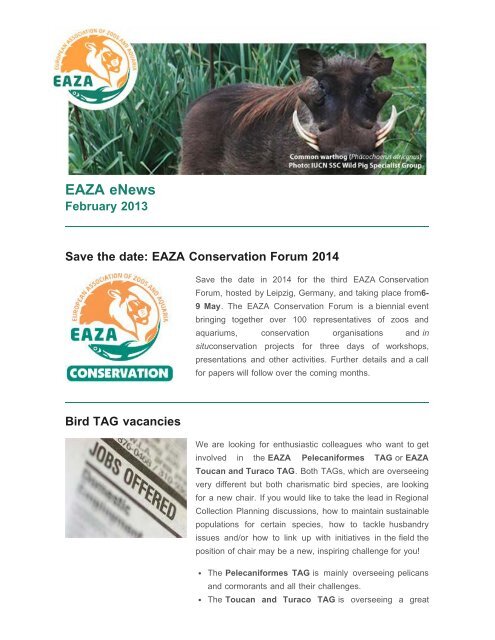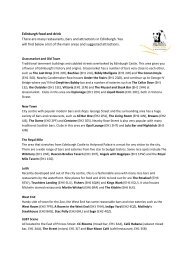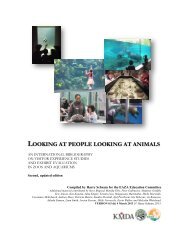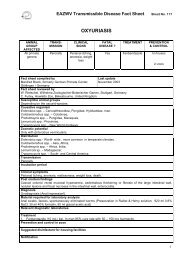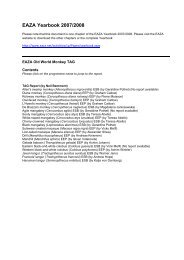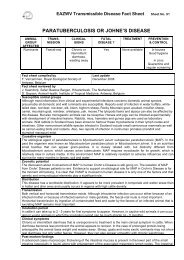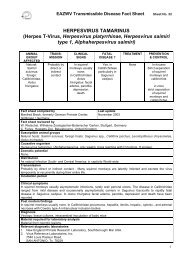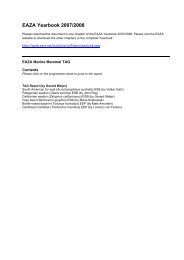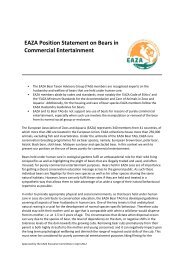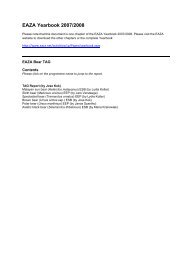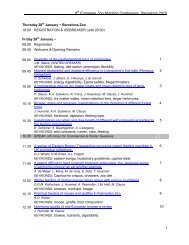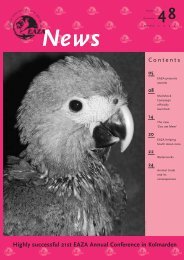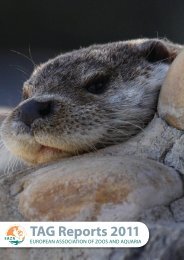EAZA eNews_February 2013 - European Association of Zoos and ...
EAZA eNews_February 2013 - European Association of Zoos and ...
EAZA eNews_February 2013 - European Association of Zoos and ...
You also want an ePaper? Increase the reach of your titles
YUMPU automatically turns print PDFs into web optimized ePapers that Google loves.
<strong>EAZA</strong> <strong>eNews</strong><br />
<strong>February</strong> <strong>2013</strong><br />
Save the date: <strong>EAZA</strong> Conservation Forum 2014<br />
Bird TAG vacancies<br />
Save the date in 2014 for the third <strong>EAZA</strong> Conservation<br />
Forum, hosted by Leipzig, Germany, <strong>and</strong> taking place from6-<br />
9 May. The <strong>EAZA</strong> Conservation Forum is a biennial event<br />
bringing together over 100 representatives <strong>of</strong> zoos <strong>and</strong><br />
aquariums, conservation organisations <strong>and</strong> in<br />
situconservation projects for three days <strong>of</strong> workshops,<br />
presentations <strong>and</strong> other activities. Further details <strong>and</strong> a call<br />
for papers will follow over the coming months.<br />
We are looking for enthusiastic colleagues who want to get<br />
involved in the <strong>EAZA</strong> Pelecaniformes TAG or <strong>EAZA</strong><br />
Toucan <strong>and</strong> Turaco TAG. Both TAGs, which are overseeing<br />
very different but both charismatic bird species, are looking<br />
for a new chair. If you would like to take the lead in Regional<br />
Collection Planning discussions, how to maintain sustainable<br />
populations for certain species, how to tackle husb<strong>and</strong>ry<br />
issues <strong>and</strong>/or how to link up with initiatives in the field the<br />
position <strong>of</strong> chair may be a new, inspiring challenge for you!<br />
The Pelecaniformes TAG is mainly overseeing pelicans<br />
<strong>and</strong> cormorants <strong>and</strong> all their challenges.<br />
The Toucan <strong>and</strong> Turaco TAG is overseeing a great
Pigs in (web)space<br />
<strong>EAZA</strong> Academy Graduates in 2012<br />
variety <strong>of</strong> perhaps unexpected bird species, like<br />
woodpecker, kingfisher, bee-eater <strong>and</strong> roadrunner.<br />
If you are interested <strong>and</strong>/or would like to have more<br />
background information please get in touch with William van<br />
Lint.<br />
The IUCN/SSC Wild Pig Specialist Group has recently<br />
launched a new website dedicated to information about wild<br />
pigs <strong>and</strong> the work <strong>of</strong> the SG. Please visit the site here <strong>and</strong><br />
go back regularly as much more is still to come! One thing<br />
that would help to make the site even more attractive is<br />
beautiful photos <strong>of</strong> wild pigs. We hope that you already have<br />
an abundance <strong>of</strong> beautiful, cute, interesting <strong>and</strong> awe<br />
inspiring pictures <strong>of</strong> these wonderful animals in your<br />
collections <strong>and</strong> that you might be willing to make some <strong>of</strong><br />
them available for the website.<br />
Please send your photos (with credits) to your <strong>EAZA</strong> Pigs<br />
<strong>and</strong> Peccaries TAG chair <strong>and</strong> Wild Pig SG<br />
member: Alastair Macdonald.<br />
Congratulations to the 379 people who completed <strong>EAZA</strong><br />
Academy courses in 2012. In total 19 courses were <strong>of</strong>fered,<br />
ranging from breeding programme management to forage<br />
production, from visitor studies to zoo <strong>and</strong> aquarium<br />
management. 72% <strong>of</strong> course participants came from <strong>EAZA</strong><br />
members, with the top three countries sending people on<br />
courses being the Netherl<strong>and</strong>s, United Kingdom <strong>and</strong><br />
Germany.<br />
Further information about <strong>EAZA</strong> Academy course graduates<br />
can be seen on the <strong>EAZA</strong> Academy Graduates page.<br />
If you would like to be on the list for this year the <strong>EAZA</strong><br />
Academy prospectus for <strong>2013</strong> is out now!
ZIMS web-based platform processes 1 millionth data<br />
transaction<br />
Measuring Conservation Impact<br />
International Species Information System (ISIS) announced<br />
its Zoological Information Management System (ZIMS) webbased<br />
solution processed over 1 million data transactions<br />
since the product launch 8 months ago in April 2012.<br />
"Over 470 zoos <strong>and</strong> aquariums in our network have selected<br />
ZIMS as their world-st<strong>and</strong>ard in animal data collection <strong>and</strong><br />
information sharing across 80 countries," said Roger<br />
Stonecipher, CEO <strong>of</strong> ISIS. "This makes ZIMS the largest<br />
animal management platform used by the zoo <strong>and</strong> aquarium<br />
community. The continually growing database now contains<br />
the critical information on 2.6 million animals <strong>and</strong> over<br />
10,000 different species."<br />
The millionth data transaction on ZIMS during 2012 was<br />
recorded on December 14 as the disposition to another<br />
institution <strong>of</strong> a Western Cattle Egret by Registrar Min Hsiu<br />
Kwang from Apenheul Primate Park located in Apeldoorn in<br />
the Netherl<strong>and</strong>s. Apenheul was the first zoo in the world<br />
where apes <strong>and</strong> monkeys could walk freely in the natural<br />
forest environment <strong>and</strong> among the visitors.<br />
In recent years there has been growing international<br />
recognition for the need to measure the success <strong>of</strong><br />
biodiversity conservation projects <strong>and</strong> show evidence <strong>of</strong><br />
conservation impact. With threats to biodiversity growing<br />
<strong>and</strong> limited funds available, zoos <strong>and</strong> aquariums supporting<br />
field conservation need to ensure that their investments in<br />
conservation are making a significant impact, <strong>and</strong> be able to<br />
show tangible <strong>and</strong> quantifiable results.<br />
In response to this, Chester Zoo <strong>and</strong> WAZA have developed<br />
a Conservation Impact Form based on the existing<br />
methodology formulated by the Zoo Measures Group1. The<br />
form is designed to provide a straight forward format for<br />
project coordinators to summarise project achievements <strong>and</strong><br />
for these achievements to be evaluated for their conservation<br />
impact in a st<strong>and</strong>ardised manner. The <strong>EAZA</strong> Conservation<br />
Committee has provided input in the process <strong>of</strong> developing
Callitrichid Enrichment Publication<br />
the tool <strong>and</strong> recommends <strong>EAZA</strong> members to use the form as<br />
a tool for evaluating the impact <strong>of</strong> its institutional<br />
conservation activities.<br />
The Project Conservation Impact Summary Form can be<br />
downloaded by clicking on Conservation Impact in<br />
theConservation section <strong>of</strong> the WAZA website<br />
In support <strong>of</strong> the <strong>EAZA</strong> Callitrichid TAG, Wormell et al. have<br />
been actively researching the effect <strong>of</strong> enriching<br />
environments for callitrichid species <strong>and</strong> published a paper<br />
on “Enriched environments for callitrichids”.<br />
In order to find out which foraging devices, shelters <strong>and</strong><br />
types <strong>of</strong> vegetation work best for enriching the lives <strong>of</strong><br />
marmosets <strong>and</strong> tamarins, please click here (you must be<br />
logged in to the Member Area <strong>of</strong> the <strong>EAZA</strong> website in order<br />
to view it).<br />
April <strong>2013</strong>: Join the Saola Awareness Month!<br />
BEAR in Mind conference, May <strong>2013</strong><br />
All zoos participating in the <strong>EAZA</strong> IUCN SSC Southeast Asia<br />
Campaign are encouraged to host ‘Saola Awareness Month’<br />
in April this year.<br />
The aim <strong>of</strong> Saola Awareness Month is to focus attention on<br />
the campaign with the support <strong>of</strong> campaign flagship species<br />
such as the saola. Whilst the events will be promoted as part<br />
<strong>of</strong> ‘Saola Awareness Month’ participants are encouraged to<br />
select any species that helps to communicate the campaign<br />
objectives in conjunction with the biodiversity crisis in<br />
Southeast Asia as the focus <strong>of</strong> their activities.<br />
For more information about this event <strong>and</strong> to download<br />
special resources, visit the campaign website.
From May 23 – May 25, <strong>2013</strong> Alertis – fund for bear <strong>and</strong><br />
nature conservation, is organizing the BEAR in Mind<br />
conference. The conference <strong>of</strong>fers a three-day program with<br />
many interesting speakers, opportunities to give an oral or<br />
poster presentation about your bear project, festive evening<br />
programs, a silent auction <strong>and</strong> a special photo competition!<br />
For more information about the program, registration <strong>and</strong><br />
possibilities to present your project during one <strong>of</strong> the<br />
sessions on May 23 or 24, please visit the website.<br />
You can submit your abstract <strong>and</strong> register through the Alertis<br />
website soon. Special registration fee for students. Limited<br />
space available! The conference will be conducted in<br />
English.<br />
For more information, please contact José Kok or Koen<br />
Cuyten.<br />
Symposium: Madagascar’s Eastern Rainforests<br />
Madagascar’s eastern rainforests are amongst the world’s<br />
most diverse ecosystems <strong>and</strong> are a biological treasure trove<br />
with a largely endemic flora <strong>and</strong> fauna. As a consequence <strong>of</strong><br />
anthropogenic pressure, the future <strong>of</strong> these forests is in<br />
immediate danger. Among others, the main causes <strong>of</strong><br />
deforestation are slash-<strong>and</strong>-burn agriculture, locally called<br />
“tavy”, as well as charcoal production <strong>and</strong> logging <strong>of</strong> precious<br />
timber trees.<br />
Zurich Zoo <strong>and</strong> ETH Zurich both have long-st<strong>and</strong>ing<br />
research projects <strong>and</strong> collaborations with Malagasy<br />
authorities, universities <strong>and</strong> NGOs to assist <strong>and</strong> encourage<br />
protecting the dwindling eastern rainforests. The present<br />
symposium brings together an international group <strong>of</strong><br />
scientists <strong>and</strong> policy makers with the goal to assess the<br />
value <strong>and</strong> the use <strong>of</strong> these forests <strong>and</strong> to explore<br />
perspectives for economically, socially <strong>and</strong> ecologically<br />
sustainable conservation strategies.<br />
Click here for more information...
Elasmobranch FAITAG workshop<br />
From the 8-9 <strong>of</strong> April this year <strong>EAZA</strong> <strong>and</strong> EUAC as part <strong>of</strong><br />
the Fish <strong>and</strong> Aquatic Invertebrate Taxon Advisory Group<br />
(FAITAG) will organize an Elasmobranch FAITAG workshop,<br />
hosted by the Zoological Society <strong>of</strong> London.<br />
The goal <strong>of</strong> this workshop is to discuss how we should<br />
proceed in Europe on the sustainable management <strong>of</strong><br />
captive elasmobranches.<br />
We’ll focus on the following subjects:<br />
• Collection planning, including development <strong>of</strong> the Regional<br />
Collection Plan for Elasmobranches<br />
• Breeding programme <strong>and</strong> breeding techniques<br />
• Disposing <strong>of</strong> surplus animals<br />
• Husb<strong>and</strong>ry problems<br />
• Communication<br />
Registration for this meeting is £30 to cover the costs <strong>of</strong><br />
lunch <strong>and</strong> refreshments<br />
More information can be found here<br />
Pre-announcement: Call for proposals<br />
We are pleased to announce the opening <strong>of</strong> the next round<br />
<strong>of</strong> applications for the <strong>EAZA</strong> Ape Campaign Fund. So far the<br />
Fund has supported 13 projects working on the conservation<br />
<strong>of</strong> gorillas, chimpanzees, orang-utans <strong>and</strong> gibbons.<br />
Funded projects will:<br />
Have the central goal <strong>of</strong> ‘ape conservation’<br />
Be managed by, or are partnered with, an <strong>EAZA</strong> member<br />
zoo<br />
Address one <strong>of</strong> the following issues: habitat loss; hunting<br />
<strong>and</strong> illegal trade <strong>of</strong> apes; ape disease <strong>and</strong> health; <strong>and</strong>,<br />
conserving ape species <strong>and</strong> their habitats through<br />
rehabilitation or reintroduction.<br />
All ape projects that meet these criteria are eligible, <strong>and</strong> we<br />
would particularly encourage applications in relation to orangutans<br />
<strong>and</strong> gibbons.
Application information can be found <strong>EAZA</strong> Ape<br />
Conservation Fund webpage<br />
Changes in Breeding Programmes<br />
Please pay particular attention to the eligibility criteria <strong>and</strong><br />
the assessment criteria.<br />
The closing date for applications is Friday 26th April <strong>2013</strong><br />
Mark Habben (ZSL) has been appointed as Falconiformes<br />
TAG chair<br />
Elodie Rey (PARIS-ZOO) has been approved as<br />
<strong>European</strong> otter EEP coordinator<br />
<strong>EAZA</strong>, the <strong>European</strong> <strong>Association</strong> <strong>of</strong> <strong>Zoos</strong> <strong>and</strong> Aquaria, represents <strong>and</strong> links 345 institutions<br />
<strong>and</strong> organisations in 41 countries. Formed in 1992, <strong>EAZA</strong>’s mission is to facilitate cooperation<br />
within the <strong>European</strong> zoo <strong>and</strong> aquarium community towards the goals <strong>of</strong> education, research<br />
<strong>and</strong> conservation.<br />
To subscribe to the <strong>EAZA</strong> <strong>eNews</strong>, visit the <strong>EAZA</strong> website.<br />
If you no longer wish to receive information from <strong>EAZA</strong> you can unsubscribe here.<br />
www.eaza.net<br />
t: 0031 (0)20 520 0750 f: 0031 (0)20 520 0752 e: info@eaza.net<br />
View this newsletter online


